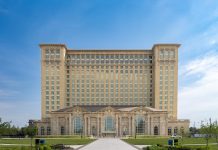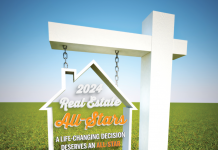Project: Michigan Central
What it is: Ford Motor Co. made waves in 2018 when it announced it had acquired the long-abandoned and decaying Michigan Central Station. Now, that vision is on the brink of coming to fruition â and itâs not just about the station itself. The station will anchor a 30-acre walkable campus known as Michigan Central, which will contain restaurants, retail and event spaces, a luxury hotel, public art, testing infrastructure,Ìýa mobility testing platform, outdoor plazas, innovation labs, and more.
Vishaan Chakrabarti, the architect overseeing the project, told Â鶹·¬ºÅ Detroit in 2022 that âitâs about the buildings, but itâs also about the space between the buildings and how to create an invitation to the station.â
Where: Corktown
When: One building, The Factory, (home to someÌýof Fordâs vehicle business and operation team members) is already open. The Book Depository (the innovation hub) is expected to open this spring. The Station (a mixed-use space with a public concourse, a restaurant, and retail and office space) will be open by the end of the year, officials say.
How much: $950 million, with the state contributing at least $126 million in program spending to support the district.
Project: Detroit Riverfront
What it is: It was 20 years ago that the Detroit Riverfront Conservancy was formed with the goal of spanning fromÌýthe MacArthur Bridge to the Ambassador Bridge. Since its inception, the conservancy has worked on several projects along the 5.5-mile stretch, including cleanups, park restorations, pedestrian bridges, and lighted walkways, to make the riverfront a place where anyone can visit and enjoy a piece of the Detroit shoreline.
Broken up into two portions, the east and west riverfront are divided at the former site of Joe Louis Arena. This year, the 3.5-mile eastern stretch will be finished with the completion of the Uniroyal Promenade, which will connect Gabriel Richard Park with Mount Elliott Park, providing a pathway to the bridge to Belle Isle. It will feature separate areas for pedestrians and bicyclists.
The project, which broke ground in May 2021, is expected to wrap up this summer.
In November 2022, the Detroit Riverfront Conservancy and Michigan Central invited the community and media to a preview of the 0.75-mile Southwest Greenway trail, which will connect the riverfront to the Corktown, Hubbard Richard, and Southwest Detroit neighborhoods, including Michigan Central. At the trailhead is Michigan Centralâs Bagley Mobility Hub, which will provide parking for the surrounding area, plus platforms for art presentation. Workers broke ground on the project in April 2022. The greenway is expected to be complete this winter and open next spring.
Finally, the former West Riverfront Park will become the Ralph C. Wilson Jr. Centennial Park, a 22-acre destination with basketball courts, a Delta Dental Play Garden, a large water garden, and the DTE Foundation Hill. The park will be one of the most significant projects on the horizon for the conservancy, officials say, helping it reach the goal of developing 5.5 miles of revitalized riverfront. The two-year project, started in May 2022, is expected to be complete sometime in 2024.
Where: Detroit riverfront
Project: Brush Watson

What it is: This mixed-income housing project, located in Brush Park, will encompass 308 residential units across three buildings.ÌýAbout half of those units â 160 â will serve
as affordable housing, to be rented out at a starting rate of $500 per month. Detroit Mayor Mike Duggan has long championed support for mixed-income and affordable housing.
âThe preservation and creation of affordable housing is the cornerstone of our growth strategy,â Duggan told DBusiness in 2018. âAffordable housing offers stability for the cityâs low-income residents and provides options to households at a range of incomes in all neighborhoods. This is what we are talking about when we say that we are building one city for all of us.â
An outdoor terrace will occupy the Brush buildingâs rooftop, while aÌýSky Lounge is planned for the 10th floor of the Midblock building. Altogether, the development includes more than 11,000 square feet of commercial space.
Where: Brush and Watson streets
When: Occupancy of the first building is expected to begin in early 2023.
How much: $60 million, with the developers receiving about $3.8 million from the low-income housing tax credit.
Project: Exchange

What it is: The 16-story building started raising eyebrows the moment construction started. Using a technology called Liftbuild, Exchange is being built from the top down rather than from the ground up, with each story being raised one at a time around two large central columns â the first time the tech has been used in North America. The downtown high-rise will include residential units comprising 152 rentable apartments andÌý12 for-sale condominiums.
What sets this apart from other residential buildings? How about 24/7 valet service and a full smart-home ecosystem, including thermostats, locks, lights, and appliances throughout the building? Thatâs not counting the views of the city, the sports district, and the Detroit River (the rooftop terrace should have some pretty impressive views, too).
Where:
When: Expected completion in March 2023.
How much: $64.6 million
Project: Isaac Agree Downtown Synagogue

What it is: Coming out of its centennial year, the last freestanding synagogue in Detroit will undergo a two-phase renovation, trading in brick walls for floor-to-ceiling glass windows on the facade and adding dedicated space for children, as well as a Jewish coworking space on upper levels of the building. Phase two will include a roof deck.
Admistrators at the synagogue, which has long been known for its welcoming atmosphere, are looking to expand its mission as a gathering place and hub for Detroitâs Jewish community.
Where:
When: Expected completion in February 2023.
How much: $6 million
Project: Joe Louis Parking Deck
What it is: When the Detroit Red Wings said goodbye to Joe Louis Arena, Detroit said goodbye to about 1 million square feet of parking space. Thatâs a problem for a growing downtown thatâs drawing more and more people to explore what it has to offer.ÌýEnter the Joe Louis parking deck.
The third largest parking garage in the downtown area is being updated with structural repairs, new LED lights, public art installations, electric car charging ports, dry cleaning drop-off and pickup, and scooter rentals.
While the deck will primarily be used as monthly parking for tenants of the 211 W. Fort St. tower, monthly parking will also be available to other members of the Detroit business district, starting at $175 a month, and Huntington Place will manage the deck and offer event parking.
Where:
When: The first five of eight floors have been completed, and the rest is expected to be completed by fall 2023.
How much: $15-20 million
Project: Residences at 150 Bagley

What it is: Detroit-based and Black-led, the Bagley Development Group is bringing the historic Ilitch-owned United Artists Building near Grand Circus Park back to life. The building is being transformed into residential units while, developers say, maintaining the character of the 1928 18-story landmark, which has sat mostly vacant for about 50 years.
The development will include 148 residential units, 20 percent of which will be affordable housing, as well as 10,500 square feet of retail on the first floor.
Where:
When: The project is expected to open by the third quarter of 2023.
How much: $75 million, with support from the Department of Housing and Urban Development, the Michigan Community Revitalization Program, block grants, and historic tax credits.
Project: Roost Book Tower

What it is: Part of the larger Book Tower development, Roost Book Tower is taking extended stays in Detroit to the next level, seeking to merge the feeling of apartment living and boutiqueÌýhotels.
In 2015, The Philadelphia Inquirer (Method Co., based in Philadelphia, operates several Roost locations across the country) called the Roost vision âboutique hotel meets Airbnb.â
The development will offer 118 studio and one- and two-bedroom apartments featuring contemporary furnishings, antique elements, and custom lighting. Amenities will include a bike-share program, coworking space, on-site housekeeping and maintenance services, and a coffee concierge and in-apartment artisanal coffee program with La Colombe CoffeeÌýRoasters.
Where: .
When: Construction is expected to be completed at some point this year, with an exact timeline for the Book Tower development, including Roost Book Tower, expected soon.
How much: $313 million for the full Book Tower project.
This story is from the January 2023Ìýissue of Â鶹·¬ºÅ Detroit magazine. Read more in our digital edition.Ìý
|
| Ìý |
|








